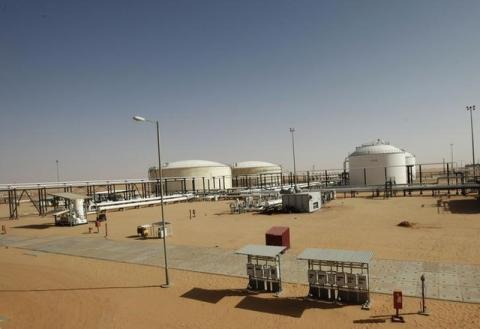Advertisement
Protesters agree to end blockade of western Libya oil pipelines - officials
TRIPOLI (Reuters) - Protesters blockading pipelines to Libya's Sharara and El Feel oil fields have promised to reopen them and production could restart in the coming days, security officials and an oil industry source said on Wednesday.
Reopening the fields could add 365,000 barrels per day (bpd) to Libya's production, which has been drastically reduced by conflict and political disputes.
National output has doubled since September to about 600,000 bpd after blockades at major ports were lifted, but it remains far below the 1.6 million bpd the OPEC member was producing before its 2011 uprising.
A faction of Libya's Petroleum Facilities Guard (PFG) that has blockaded one pipeline since November 2014 and another since April 2015 said in a statement that they had agreed to reopen both.
"The National Oil Corporation should start its work as soon as possible and we, as the Petroleum Facilities Guard, pledge to protect and defend the wealth of the Libyan state," the statement said.
The PFG faction is aligned with the self-styled Libyan National Army (LNA), a force based in eastern Libya. Its statement was confirmed by the office of Idris Madi, head of the LNA's command centre in its western outpost of Zintan. Madi's office said the blockade would end by Thursday.
A National Oil Corporation (NOC) source confirmed the deal, but said the resumption of production was not guaranteed, as similar previous pledges had fallen through.
He said that NOC subsidiaries at the Zawiya refinery and Mellitah complex, which are fed from Sharara and El Feel, had been readying for a restart.
"Both companies are preparing their facilities to resume production. Also in the fields there have been preparations," he said, adding that any restart would be gradual.
The NOC has said that it hopes to raise production to 900,000 bpd in the near future and to 1.1 million bpd next year, though it says those increases are dependent on blockades ending and the NOC receiving new funds for its operating budget.
Libya's continuing political turmoil remains a threat to any production recovery, with rival governments in the east and west of the country and armed factions competing for power and oil wealth.
(Reporting by Ahmed Elumami; Writing by Aidan Lewis; Editing by Patrick Markey and David Goodman)



















Add new comment